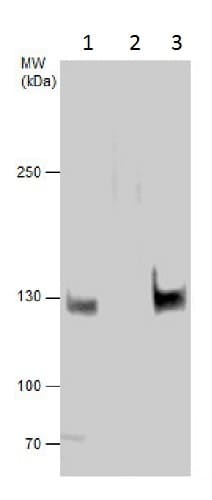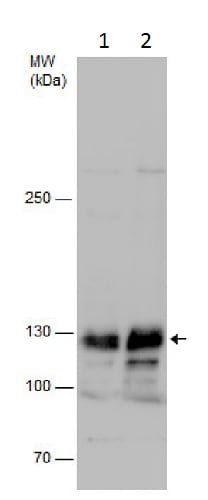Anti-TTF1 antibody (ab229564)
Key features and details
- Rabbit polyclonal to TTF1
- Suitable for: IP, IHC-P, WB
- Reacts with: Human
- Isotype: IgG
Overview
-
Product name
Anti-TTF1 antibody
See all TTF1 primary antibodies -
Description
Rabbit polyclonal to TTF1 -
Host species
Rabbit -
Tested applications
Suitable for: IP, IHC-P, WBmore details -
Species reactivity
Reacts with: Human -
Immunogen
Recombinant fragment within Human TTF1 (internal sequence). The exact sequence is proprietary.
Database link: Q15361 -
Positive control
- WB: HEK-293T nuclear and whole cell extracts. IP: HEK-293T whole cell extracts. IHC-P: Human small cell lung cancer tissue.
-
General notes
This product was previously labelled as Transcription termination factor 1
Properties
-
Form
Liquid -
Storage instructions
Shipped at 4°C. Store at +4°C short term (1-2 weeks). Upon delivery aliquot. Store at -20°C long term. Avoid freeze / thaw cycle. -
Storage buffer
pH: 7.00
Preservative: 0.025% Proclin 300
Constituents: 79% PBS, 20% Glycerol (glycerin, glycerine) -
 Concentration information loading...
Concentration information loading... -
Purity
Immunogen affinity purified -
Clonality
Polyclonal -
Isotype
IgG -
Research areas
Images
-
 Immunohistochemistry (Formalin/PFA-fixed paraffin-embedded sections) - Anti-TTF1 antibody (ab229564)
Immunohistochemistry (Formalin/PFA-fixed paraffin-embedded sections) - Anti-TTF1 antibody (ab229564)Paraffin-embedded human small cell lung cancer tissue stained for TTF1 with ab229564 at 1/500 dilution in immunohistochemical analysis.
-
TTF1 was immunoprecipitated from HEK-293T (human epithelial cell line from embryonic kidney transformed with large T antigen) whole cell extract with 5 µg ab229564. Western blot was performed from the immunoprecipitate.
Lane 1: HEK-293T whole cell extract (Input).
Lane 2: Control IgG IP in HEK-293T whole cell extract.
Lane 3: ab229564 IP in HEK-293T whole cell extract.
-
All lanes : Anti-TTF1 antibody (ab229564) at 1/1000 dilution
Lane 1 : HEK-293T (Human epithelial cell line from embryonic kidney transformed with large T antigen) whole cell extract
Lane 2 : HEK-293T (Human epithelial cell line from embryonic kidney transformed with large T antigen) nuclear extract
Lysates/proteins at 30 µg per lane.
Developed using the ECL technique.5% SDS-PAGE













